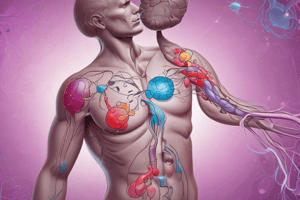Podcast
Questions and Answers
What is the primary role of somatostatin in the endocrine pancreas?
What is the primary role of somatostatin in the endocrine pancreas?
- To stimulate the release of insulin.
- To inhibit other active hormones. (correct)
- To enhance the effects of glucagon.
- To promote the secretion of digestive enzymes.
Which hormone is primarily opposed by somatostatin?
Which hormone is primarily opposed by somatostatin?
- Glucagon (correct)
- Adrenaline
- Cholecystokinin
- Cortisol
What other hormones are mentioned as being present within the GI tract along with somatostatin?
What other hormones are mentioned as being present within the GI tract along with somatostatin?
- Insulin and glucagon (correct)
- Cortisol and adrenaline
- Serotonin and melatonin
- Estrogen and testosterone
What is the significance of the phrase used by surgeons regarding the pancreas?
What is the significance of the phrase used by surgeons regarding the pancreas?
Which statement about somatostatin is true?
Which statement about somatostatin is true?
What is the primary function of glucagon released by alpha islet cells?
What is the primary function of glucagon released by alpha islet cells?
Which type of cells are responsible for the release of glucagon in the pancreas?
Which type of cells are responsible for the release of glucagon in the pancreas?
What is the relationship between the endocrine pancreas and diabetes?
What is the relationship between the endocrine pancreas and diabetes?
In what form does glucagon primarily convert stored glucose?
In what form does glucagon primarily convert stored glucose?
Where do the hormones released by the endocrine pancreas go after secretion?
Where do the hormones released by the endocrine pancreas go after secretion?
Which of the following best describes islet cells in the pancreas?
Which of the following best describes islet cells in the pancreas?
How many main types of islet cells are discussed in relation to the endocrine pancreas?
How many main types of islet cells are discussed in relation to the endocrine pancreas?
What happens to glycogen when glucagon is released?
What happens to glycogen when glucagon is released?
What is the primary function of glucagon in the body?
What is the primary function of glucagon in the body?
What role does insulin play in relation to glucose?
What role does insulin play in relation to glucose?
What complications are associated with unmanaged diabetes?
What complications are associated with unmanaged diabetes?
How is type one diabetes characterized?
How is type one diabetes characterized?
What distinguishes type two diabetes from type one diabetes?
What distinguishes type two diabetes from type one diabetes?
Which statement accurately describes insulin's role in macromolecule storage?
Which statement accurately describes insulin's role in macromolecule storage?
What is a significant consequence of chronic high glucose levels in the body?
What is a significant consequence of chronic high glucose levels in the body?
What primarily causes the symptoms associated with diabetes?
What primarily causes the symptoms associated with diabetes?
What is the cause of nerve damage in diabetic patients?
What is the cause of nerve damage in diabetic patients?
What characterizes delta islet cells in the pancreas?
What characterizes delta islet cells in the pancreas?
Flashcards are hidden until you start studying
Study Notes
Endocrine Pancreas Overview
- Endocrine pancreas is notable for its role in diabetes management.
- It releases hormones directly into the bloodstream, affecting organs like the liver, intestines, and muscles.
Islet Cells Types
- Islet cells, or "islets of Langerhans", consist of three main types:
- Alpha Islet Cells:
- Produce glucagon, which converts glycogen to glucose, thereby increasing blood sugar levels.
- Also responsible for breaking down various macromolecules.
- Beta Islet Cells:
- Produce insulin, critical for glucose storage by converting it into glycogen.
- Plays a significant role in metabolic processes, affecting carbohydrate, fat, and protein storage.
- Directly linked to diabetes by failing to regulate blood glucose levels properly.
- Delta Islet Cells:
- Release somatostatin, which inhibits the action of other hormones, including glucagon and insulin, to maintain balance in the body.
- Alpha Islet Cells:
Diabetes and Insulin
- Diabetes occurs when insulin fails to regulate blood glucose, leading to high sugar levels.
- Symptoms of uncontrolled diabetes include damage to the eyes, nerves, and kidneys.
- Type 1 Diabetes:
- Characterized by absolute insulin deficiency; the body produces no insulin.
- Results in high glucose levels and complications similar to those seen in diabetes.
- Type 2 Diabetes:
- Insulin is produced but receptors are dysfunctional, leading to a lack of response.
- Can also result in high glucose levels and associated health complications.
Complications Related to Diabetes
- Chronic high glucose levels can lead to severe complications:
- Eye disease can lead to vision loss.
- Nerve damage, particularly in the feet, increases risk of injury and amputation.
- Kidney failure may require dialysis and can result in early death.
- Increased risk of cardiovascular events like heart attacks.
Importance of the Pancreas
- The pancreas is vital for metabolic regulation, affecting digestion and hormone balance.
- It's essential to take care of this organ, often summarized by the phrase used by surgeons: "Eat when you can, sleep when you can, and don't mess with the pancreas."
Studying That Suits You
Use AI to generate personalized quizzes and flashcards to suit your learning preferences.



